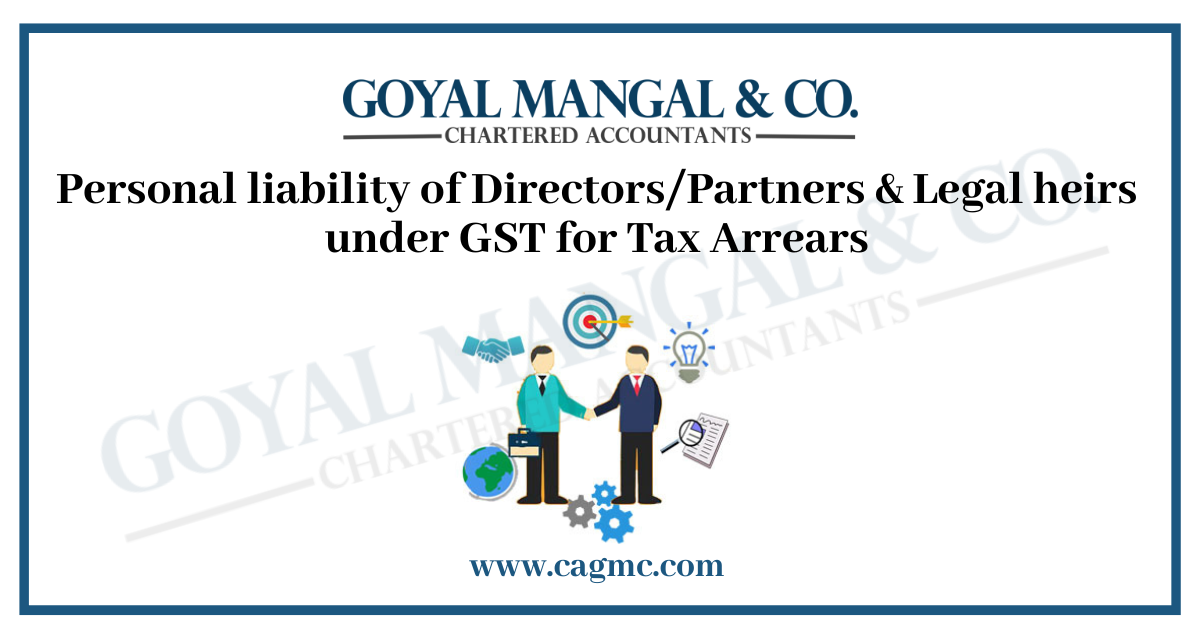 Tax arrears recovery from defaulters has always been a difficult area for tax authorities. Such recovery becomes even more difficult if the company/firm goes into receivership, is dissolved, lacks paying capacity, is untraceable, or the proprietor has died. In the indirect tax case, remember that the tax amount defaulted by business entities was already collected from the ultimate consumer, i.e. the general public. As a result, the business entity should not be given a pass on the misappropriation of public money.
Tax arrears recovery from defaulters has always been a difficult area for tax authorities. Such recovery becomes even more difficult if the company/firm goes into receivership, is dissolved, lacks paying capacity, is untraceable, or the proprietor has died. In the indirect tax case, remember that the tax amount defaulted by business entities was already collected from the ultimate consumer, i.e. the general public. As a result, the business entity should not be given a pass on the misappropriation of public money.
Short Glimpse
The Goods and Services Tax (‘GST’) was implemented in 2017 to replace multiple cascading indirect taxes imposed on the supply of certain goods and services, including Value Added Tax, Service Tax, Purchase Tax, and Excise Duty. GST was implemented in accordance with the powers granted to the Central and State Governments to collect taxes under the Indian Constitution. The collection of both direct and indirect taxes is a top priority for the government because the taxes collected are critical to the country’s infrastructure development, human capital, and maintaining a proper balance between increased revenue generation, long-term growth, and lower compliance costs.
However, recovering tax arrears following the death of a taxable person has proven to be a difficult task for tax authorities. When a director, partner, or sole proprietor of a business entity dies, the process becomes even more complicated.
The GST law not only covers the recovery of such tax dues from the GST era, but it also covers revenue arrears from the previous regime that are recoverable but were not recoverable under the previous service tax/VAT or central excise law.
Before we shall move on to discuss Personal Liability of Directors/Partners, Legal Heirs under GST for tax arrears, Let us discuss, who are Directors/Partners, Legal Heirs.
Directors in a Private Company
Directors are the members of the collective body known as the Board of Directors who are in charge of controlling, managing, and directing a company’s affairs. Directors are considered trustees of the company’s property and money, and they also act as agents in transactions entered into on the company’s behalf.
Directors are expected to carry out their duties and obligations as rationally diligent individuals with the same skill, knowledge, and experience as the person performing director functions and him.
A company’s affairs are controlled, managed, and directed by its directors. He/she has several roles in the company. As a result, a director serves in several capacities in a company: agent, employee, officer, and trustee.
Partner’s in a Partnership Firm
A partnership is an agreement between two or more people who agree to split profits and losses for the benefit of the partnership firm. However, in a partnership, all partners do not participate equally in the firm’s activities for profits and losses. There are various types of partnerships based on their level of liability and participation in the firm.
A partnership, according to Section 4 of the Indian Partnership Act, 1932, is defined as a relationship between two people who have mutually agreed to share the business’s profits and losses. As a result, individuals who have entered into an agreement with one another are referred to as “partners.”
Who are the Legal Heirs of a Person?
If you own property, you can name it after your death to your family members, and they will have the right to it. However, claiming your property after your death is not an easy task because a legal heir certificate is required. As a result, you must be aware of the legal heir certificate. Professional lawyers can draught and register your legal heir certificate, which you can apply for at your local municipality or district civil court corporation.
If a male person dies without leaving a will, his property is divided among his legal heirs, according to the Hindu Succession Act. There are two kinds of legal heirs: class I and class II.
This law allows Hindu, Jain, Sikh, and Buddhist families to obtain a legal heir certificate. However, this law is applied differently to men and women. Also, under the Class-I of the Hindu Succession Act, his son, wife, daughter, and mother can claim his property after his death.
An intestate male’s property will be distributed equally among his family members. For example, if you are married and do not have a will, your property will be distributed to your wife, son, and daughter in accordance with Class-I of the Hindu Succession Act. If you are unmarried, your property will pass to your mother upon your death.
In the case of Class-I, Hindu Succession Act, a deceased person’s property is divided into two parts: one is transferred to his wide, and the other is distributed among his children. There is no need to make a will for the same property; if no will is made, the same law will apply for two generations.
The Hindu Succession Act applies to both sons and daughters. For example, if a person dies without leaving a will, his property will be distributed to his wife and daughters. However, in the case of a deceased person’s daughter, her husband cannot claim any of his father-in-property law on behalf of his wife.
This Act allows family members, including relatives, to claim a deceased person’s property. In this case, relatives in higher courts may obtain complete ownership of a deceased person’s property. If no one falls into this category, the deceased person’s property is transferred to his relatives. In the case of a deceased male, for example, his father, granddaughter’s children, brother, and sisters can all claim his property under the first category. In the case of a deceased unmarried person, his property is divided among his brother, sister, and father.
Personal liability of Directors/Partners & Legal heirs under GST for Tax Arrears
Let us now discuss the Personal Liability of Directors/Partners & Legal heirs under GST for Tax Arrears:
Liability of Directors of Private Company
This section prevails over the Companies Act, 2013. If a private company fails to pay its dues, the directors of that company will be jointly and severally liable for those dues. In this case, only the directors who were in office during the period when the tax was due will be liable. If the director can prove to the commissioner that the non-payment was due to his negligence or breach of duty on his part, he is not responsible. However, if the company has been converted from a private to a joint-stock company, the above does not apply.
Case for illustration for Liability of a Director: In a court case, a director of three companies was held liable for GST owed by the companies due to the sale of assets. At that time, the sale proceeds received by the companies included GST of $1.7 million. The director of the companies was involved in sales transactions. Prior to the settlement of the asset sale, the director oversaw or arranged a number of transactions between companies under his control, including the assignment of loans.
Held: The High Court ruled that the sale of the properties in question converted the companies’ assets from land and buildings to cash. The net sales proceeds were then taken from the companies as part of the arrangement, and after various transactions and steps taken, the companies were unable to satisfy their GST debts. That was the result of the arrangement. The director claimed that this was achieved regardless of any other motive. The court also noted that there was no doubt from the director’s admission that he was likely to have made reasonable inquiries at the time of the arrangement and assumed that GST liabilities of approximately $1.7 million incurred at the time of delivery of the sale properties to the Council would need to be met. Therefore, he was held personally liable for GST.
Liability of Legal Heirs
Section 93 of the Central Goods and Services Tax Act, 2017 (hereinafter referred to as the “CGST Act”) deals with the obligation of legal heirs and legal representatives to pay tax arrears in the event of the death of a taxable person. It states that if the legal heirs continue the business, then that person will be liable to pay the tax, interest, or penalty in the event of the death of the taxable person. In case of interruption of business before or after the death of the person liable for tax, the legal heir from the estate of the deceased shall pay the owed taxes, interest, and penalties.
The following elements determine the liability of legal heirs under the CGST Act on the death of a taxable person:
- The nature or form (i.e. whether the taxable person is a sole proprietor, a partner in a partnership firm, or a director of a company) of the taxable person;
- Whether the death of the person results in the transfer of the business; and
- Whether the legal heirs of the taxable person or the remaining partners of the partnership firm wish to continue operating the businesses or close them down.
In the case of Kamal Gupta v. Bank of India AIR 2008 Delhi 51, the Delhi High Court observed that legal heirs are liable for the debts of their predecessor to the extent of the property they inherited from their predecessor. They are not personally liable for the liability of the predecessor, but the liability is to the extent of the estate of the deceased.
Liability of Partners of a Partnership Firm
In a partnership firm, all partners have unlimited liability. Similarly, under GST, the partners of a firm are jointly and severally liable to pay all GST charges notwithstanding any clause in the partnership agreement or any other law. In the event of the retirement of a partner, the firm or the retiring partner must inform the commissioner.
A retiring partner could be liable for charges under GST up to the date of his retirement. If any information regarding retirement is not provided within 1 month, the retiring partner will continue to be liable until such notification is received by the Commissioner.
For example, ABC & Co. is a partnership firm with 3 partners. C retired on August 20, 2018. ABC & Co. has an amount due of Rs.10, 000 due by August 20th, and C informs the Commissioner on August 30th, 2018, after which C is liable for the amount due of Rs.10, 000. Now, if neither C nor the firm informs the Commissioner of his retirement and ABC & Co. will not pay the charges until it reaches 25,000 on September 30, 2018 (when they finally inform the commissioner), then C will be liable for Rs. 25,000, though Rs. 15,000 was spent after he retired.
Judicial Opinion on Liability of Partners under GST for Tax Arrears: In S.P. Misra & Ors. v. Mohd. Laiquddin Khan & Anr., C.A. No. 3311 of 2015, dated 18/10/2019, the Supreme Court decided that due to the death of one of the partners, the partnership itself is dissolved by law in accordance with 42 letters (c) of the Indian Partnership Act, 1932.
In such circumstances, on the dissolution of the partnership firm, there cannot be a partnership in which the legal heirs can assume the partnership in place of the deceased.
In Smt. S. Parvathammal v. CIT, 1987, 163 ITR 161 Mad, the Madras High Court held that a partnership ordinarily terminates on the death of a partner unless otherwise provided in the original partnership deed. Even if such an arrangement exists in a partnership of two partners, the partnership automatically terminates when one of them dies. There is no longer any partnership into which a third party can be admitted. A partnership is not a hereditary position but rather a contractual arrangement.
Conclusion
The government is enshrined in the responsibility of collecting taxes with the power of law under the Constitution of India. This authority to collect taxes also applies to the collection of tax arrears from the legal heirs of a taxable person after the death of the such person. The introduction of the CGST Act, of 2017 proved to be beneficial to the country’s economy by subsuming all the prevailing earlier taxes and unifying the indirect tax legislation. However, a significant gap exists in the uniformity of liability of the legal heir in the event of the death of the sole owner, partner, or director of various business entities.


